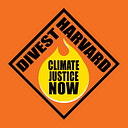On Earth Day’s 50th Anniversary, Harvard Community Rallies for Climate Justice and Divestment
Harvard Sidesteps Its Role In Fighting Climate Change, Community Pledges to Continue Mobilizing
Undeterred by present circumstances, over 100 members of the Harvard community came together virtually Wednesday evening to rally for climate justice and divestment. As Earth Day marked its 50th anniversary, the students, faculty, alumni, and community members in attendance reaffirmed their commitment to ending Harvard’s institutional complicity in the climate crisis.
The rally comes on the heels of two announcements in sharp contrast: On Tuesday, Oxford University sent a historic message, committing to divest from the fossil fuel industry. Just hours later, Harvard University once again declined to divest its endowment — the largest of any university — from the fossil fuel industry, instead promising net-zero carbon emissions from its endowment by 2050. While this announcement marks Harvard’s first acknowledgment, after years of activist pressure, that its endowment can play a role in creating social and political change, it is also radically insufficient given what is needed to create a just transition and stable future.
“This is not a timeline that has anything to do with science, said Bill McKibben ’82 in regards to Harvard’s announcement. Instead, McKibben, a renowned environmental activist whose 2012 essay “Global Warming’s Terrifying New Math” helped spark the divestment movement, called on the Harvard community to fight harder than ever: “It turns out that the scariest words in the English language are things like ‘We’ve run out of ventilators’ or ‘The hillside behind your house is on fire.’ Those are the kind of problems you can only solve when people work together, and that’s why big broad movements to me are so important.”
Dr. Gaurab Basu, the Co-Director of the Center for Health Equity Education & Advocacy and instructor at Harvard Medical School, used his speech to highlight the importance of addressing climate issues in tandem with the COVID-19 crisis. “We simply can’t disconnect these issues,” he said. “Instead we must demand that we reckon with the failed policies and principles that are at the root that connects all of them.” Connections between the climate crisis and other festering injustices were also drawn by Janet MacGillivray, Executive Director of the Indigenous womxn-led collective Seeding Sovereignty. The confluence of COVID-19 and climate change, she said, is especially dangerous for indigenous communities: in the midst of this pandemic, for example, “TransCanada Energy is moving ahead with [the Coastal GasLink] pipeline without Wet’suwet’en consent, putting indigenous communities and the elders and women especially at risk.”
“As a historian studying immigration and social movements,” said Kristina Shull, a Fellow at Harvard’s Charles Warren Center for Studies in American History, “I used to think that my concerns over climate change were somehow separate from my academic work and activism. But I’ve learned that the idea of a divide between social and environmental justice is a fiction.” The rally comes in the wake of 90% of the Faculty of Arts and Sciences and 82% of the Medical School Faculty Council voting to call on the university to divest.
“I’m asking you to do one thing: fight,” said Harvard first-year Suhaas Bhat. “We have so much power… let’s put these hands to work,” added Jeremy Ornstein, another Harvard first-year, as participants took action. During the rally, attendees engaged in intimate conversations about the fight for climate justice in the time of COVID-19, highlighting the need to organize against the fossil fuel industry’s pernicious efforts to take advantage of the current public health crisis to secure regulatory relief, push through pipelines, and work to criminalize anti-fossil fuel protests. They also wrote letters to Harvard’s administration and endowment managers, emphasizing the need for Harvard to tackle both of these crises.
The coronavirus pandemic only underscores the need to create a more just and resilient society. As our organizers wrote today in The Guardian, “Right now … we have an unprecedented opportunity to [disentangle ourselves from fossil fuels]: a unique financial imperative to push for the systemic change necessary to protect our planet and our communities.” Now, FFDH will continue to push for the full commitment to climate action and public health that we expect from our leading institutions. Our call for divestment as a baseline step toward meeting this commitment is only growing stronger. Today marks a new moment in our campaign as we pave the way for investment in a more socially just and environmentally sustainable system.
